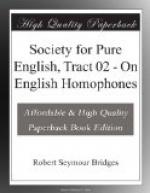This would, I suppose, fairly represent Mr. Jones’ contention. Indeed, he plainly asserts that his work is merely a record of existing facts, and he even says that he chose Southern English because it is most familiar and observable, and therefore capable of providing him with sufficient phenomena: and he might say that what I call ‘low’ in his standard is only the record of a stage of progression which I happen to dislike or have not nearly observed. And yet the argument is full of fallacies: and the very position that he assumes appears to me to be unsound. It is well enough to record a dialect, nor will any one grudge him credit for his observation and diligence, but to reduce a dialect to theoretic laws and then impose those laws upon the speakers of it is surely a monstrous step. And in this particular instance the matter is complicated by the fact that Southern English is not truly a natural dialect; Mr. Jones himself denotes it as P.S.P.=Public School Pronunciation, and that we know to be very largely a social convention dependent on fashion and education, and inasmuch as it is a product of fashion and education it is not bound by the theoretical laws which Mr. Jones would attribute to it; while for the same reason it is unfortunately susceptible of being affected by them, if they should be taught with authority. These phoneticians would abuse a false position which they have unwarrantably created. This Southern English, this P.S.P., is a ‘fashionable’ speech, fashionable that is in two senses; and Mr. Jones would fashion it.
[Sidenote: judged by practical effects.]
But I wish to put my case practically, and, rather than argue, I would ask what are the results of learning English on Mr. Jones’ system? What would be the condition of a man who had learnt in this way?
[Sidenote: His three styles.]
I shall assume that the pupil has learnt his pronunciation from the dictionary, the nature of which is now known to my readers: but they should also know that Mr. Jones recognizes and teaches three different styles, which he calls the A, B, and C styles, ’A, the pronunciation suitable for recitation or reading in public; B, the pronunciation used in careful conversation, or reading aloud in private; and C, the pronunciation used in rapid conversation.’
In a polemic against Mr. Jones his adversary has therefore to combat a dragon with three heads, and the heroic method would be to strike all three of them off at one blow. To effect this it seems to me that one has only to remark that a system which is forced to teach a dialect [a dialect, observe, not a language] in three forms where one is sufficient, is ipso facto condemned. This objection I will establish presently; at present I am content to confine my attention to one head, for I maintain that in practice those who will take the trouble to learn three forms of one speech must be a negligible number; the practical pupils will generally be content to master one, and that will, no doubt, be the highly recommended style B, and its corresponding dictionary; they will rule out A and C as works of supererogation; and indeed those would be needless if B were satisfactory.




